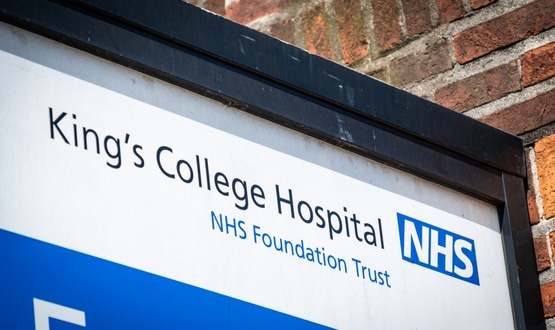Flexibility key, says Forrest
- 9 December 2004
 Martyn Forrest has been Regional Implementation Director (RID), for the North East of England since May 2003. In an exclusive interview with E-Health Insider he set out the challenges of making sure the National Programme for IT (NPfIT) is delivered to the NHS locally.
Martyn Forrest has been Regional Implementation Director (RID), for the North East of England since May 2003. In an exclusive interview with E-Health Insider he set out the challenges of making sure the National Programme for IT (NPfIT) is delivered to the NHS locally.
“I’m a conduit between the NPfIT and the NHS, responsible for the co-ordination of the planning, managing the delivery, managing the Local Service Provider (LSP) Accenture,” explained Forrest. "Basically I’m the glue in the sandwich."
Sheffield-born Forrest brings to the job a proven track record to the job, with a total of 29 years experience in IT and clinical care. Immediately before becoming RID for the North East he was chief information officer for South Yorkshire Strategic Health Authority, and was previously regional information officer for the Trent Region.
Unusually he brings both clinical and IT experience to the job, having spent the first 14 years of his career working in pathology before moving into IT. "One of the reasons I moved into IT is because I actually computerised the department I worked in," says Forrest.
He told E-Health Insider that this early experience of IT into a hospital pathology department showed "how IT can completely transform a department like that."
In his subsequent career he has overseen implementations of most of the systems now being delivered by the NPfIT. "So I do feel I come to this with a pedigree of experience having implemented systems in every healthcare setting," says Forrest
Year of preparation drawing to close
"It’s been a year of putting the building blocks in place" — Martyn Forrest, RID for the North East of England |
One of the most difficult issues to manage, he says, is matching finite implementation to the huge demand from within the NHS. "We’ve got slightly more demand than the capacity available, which gives us competition among people wanting to take services. One of the things we’ve been keen on in managing the risks has been readiness assessments. We don’t want to take anybody forward who’s not ready."
The North East RID says that a fundamental tenet of implementation is to ensure that the programme is driven from the ground up. "We’ve always tried to drive this from a bottom-up perspective, ensuring that it’s driven by local business needs. So we are not forcing this upon anyone – the demand is there from the service."
First systems now set to be delivered
The fruits of this year of planning are now beginning to be realised with systems now beginning to be delivered, he says. "We have been working with a whole range of early adopters across a whole range of settings. By the end of the calendar year we will have some applications live in the primary care arena – primary care systems and functionality to support the Single Assessment Process (SAP) for older people.”
He says that by early in 2005 new systems will start to be delivered in every health setting across the North East. "We are working with every sector – mental health, community and acute – on go-lives in the first quarter of 2005."
By the end of 2005 Forrest adds that benefits from new systems should be delivered to about half of the NHS organisations within his region. In some cases this will be sites taking nationally available services while others will be local LSP implementations and upgrades to existing systems.
"We’ll have a whole range going in, electronic booking, new primary care systems, new mental health, SAP, community, child health, and then specific areas like maternity and picture archiving," says Forrest.
Details of which suppliers Accenture has contracted with supplying the North East region with specialist systems are also becoming clearer. "The Phoenix Partnership will be available as our alternative primary care solution, but also Phoenix will be delivering child and mental health systems and we’ll be looking for that to be available from the back end of 2005," says Forest. The SAP solution for older people will meanwhile be supplied by Liquidlogic.
Choose and Book roll-out plans reflect local priorities
"You have communities who want to do one speciality across the whole of the SHA area" — Martyn Forrest |
He stresses that different health communities are taking very different approaches to Choose and Book. "Some like the Barnsley and Harrogate ones want to roll out across the whole of that cluster of interest so there will be more sites on, and at the same time they will be rolling out the range of specialities within the hospital and trust that they are booking to.
"In other places you have communities who want to do one speciality across the whole of the SHA area. So there are different approaches which we are trying to accommodate."
Asked to give an approximate number on how many Choose and Book sites will be live by the end of 2005, Forrest says: "It’s still a bit too early to give numbers, other than we do have targets at the end of 2005 to meet – we’re supposed to have a fully booked NHS for first consultant appointments. A fully-booked NHS doesn’t mean all electronic bookings but we want to make significant progress with electronic booking to help that target."
PACS implementations to number 5-6 by end 2005
"The first PACS implementation will begin pretty soon" — Martyn Forrest |
Asked to outline which sites will get PACS in 2005 the North East RID told EHI: “We’ve still not agreed specific sites yet, as we’ve still not signed our specific contract yet for PACS which is why I can’t be any clearer, but we are looking to do five or six throughout 2005.” Forrest added that it remained "highly likely" that the PACS deal for the North east would be signed with Agfa.
Building blocks for NHS CRS
Outlining what will be the early elements of the NHS Care Records Service (CRS) to be delivered Forrest says that different functionality will be delivered in each setting, with perhaps the fullest functionality initially being provided for primary care.
In hospital settings he says that the first phases of CRS will focus on administrative functions. "We won’t be delivering e-prescribing until later stages, but in the early phases we are delivering administration functions. And then will be delivering secondary links, assessment functionality and ordering results – those will be the initial building blocks."
One area that he singles out for early delivery is providing clinicians with improved access to the evidence base, using a pathway driven tool called the Map of Medicine. "We’re looking at that on a standalone basis in the early releases, and over time that kind of information will be integrated into applications to provide proper decision support."
Flexibility critical to success
"There isn’t a day that goes by we don’t learn something – it’s one of the fascinations of the national programme" — Martyn Forrest |
Asked to single out what has been the hallmark of the relationship with Accenture, Forrest replies ‘flexibility’. "Rather than sticking to the letter of their contract, we have seen some flexibility which has allowed us to listen to what the NHS has been saying and flex, have brought some things forward and deferred some things."
Specific examples of this flexibility have included bringing forward some ambulance functionality – electronic capture of record in ambulance, and when ordering in hospitals will be delivered.
“We’ve brought ordering forward in the acute and community mental health sectors – so we can deliver ordering and results simultaneously – by middle part of next year,” explains Forrest. "We are in the throes of testing that with the LSP at the minute."
He says that flexibility and responsiveness to local clinical and business needs are critical to the success of the programme. "There isn’t a day that goes by we don’t learn something – it’s one of the fascinations of the national programme. That’s one of the reasons we’ve gone with phased implementation and early adopters – we want to apply the lessons we learn from them."




